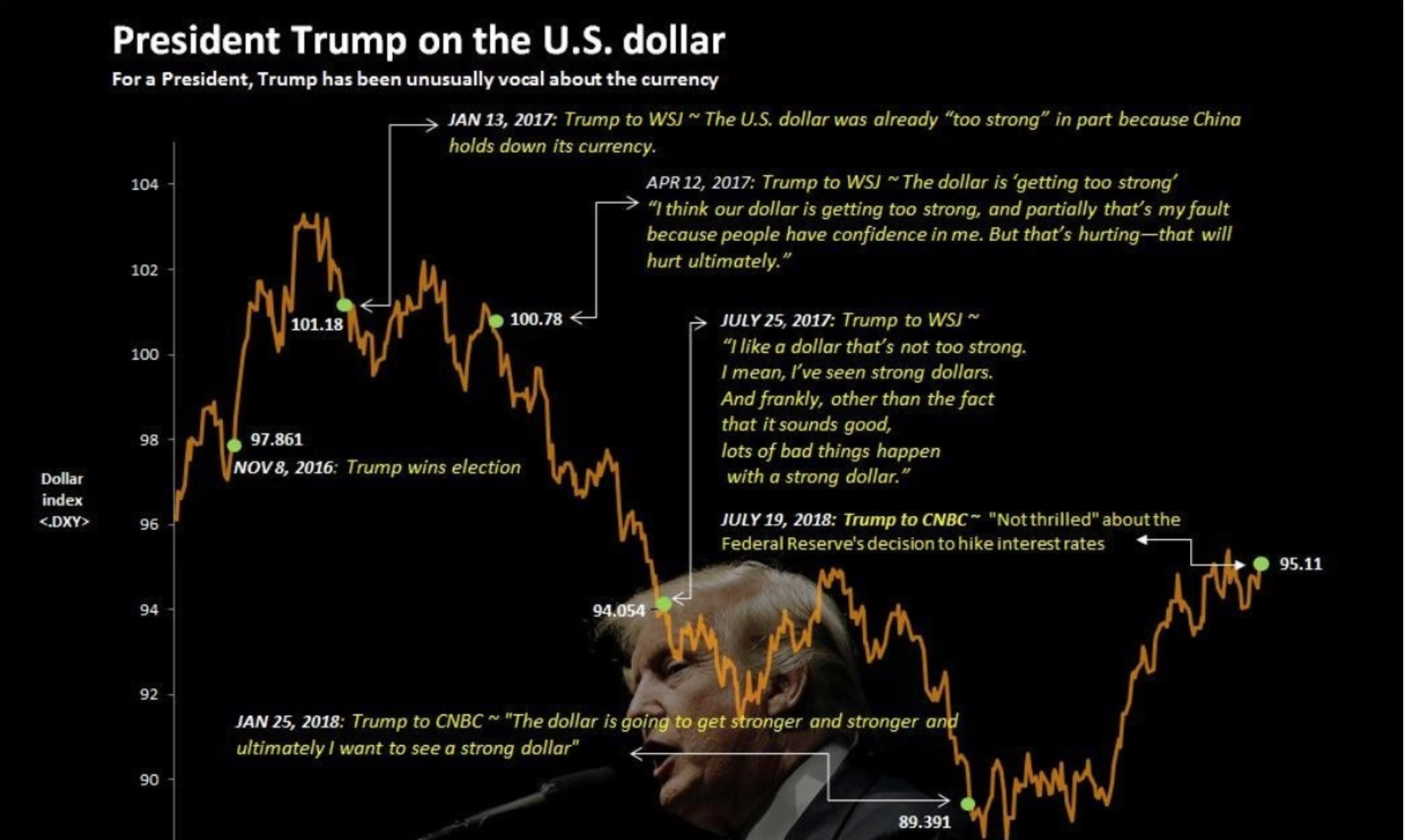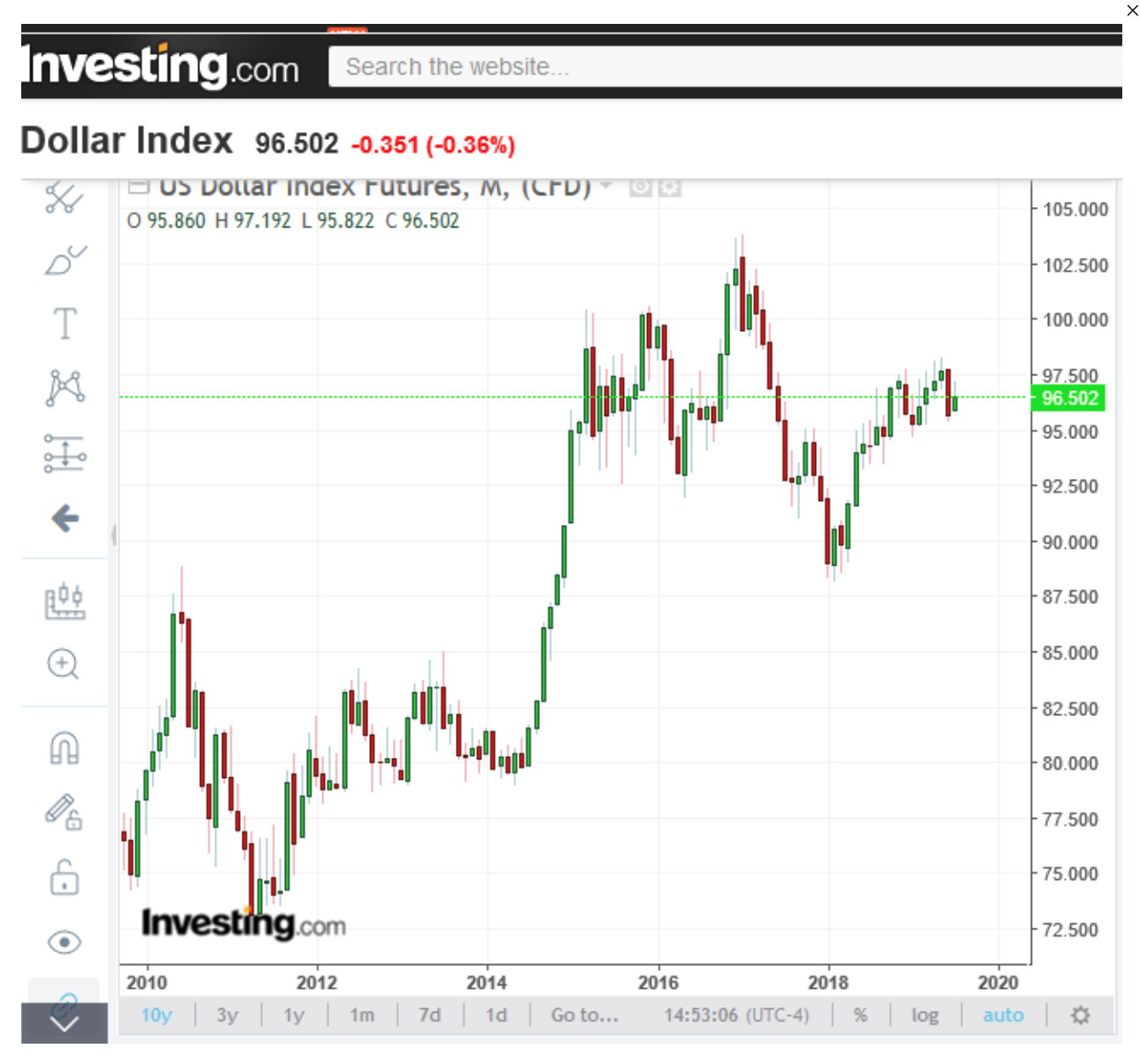Yves here. This article glosses a bit over the fact that Trump’s main claim about the value of the dollar was that it was overvalued relative to the renminbi. While that was true years ago, it hasn’t been for a while as China has been managing its “dirty float” to let the renminbi appreciate versus the dollar. Trump correctly got a lot of heat from Serious Economists when he asserted that the level of the dollar was a significant factor in the US trade deficit with China.
By Alex Kimani, a veteran finance writer, investor, engineer and researcher for Safehaven.com. Originally published at SafeHaven
Trump has been very vocal about his dislike for the Fed’s hawkish policies, repeatedly drumming up the fact that higher interest rates lead to an overly brawny dollar and slow down the economy. Trump has even, reportedly, asked White House aides to explore ways to weaken the currency in order to boost exports and boost economic growth.
Trump’s open criticisms have mostly been viewed as unconventional going by the central bank’s presumption of independence, though, of course, no president wants to be associated with an economy weakening under his or her watch.
And now, the president’s call for lower rates and a weaker dollar have just have found fresh impetus from an unexpected source—the IMF now says the American currency is 6%-12% overvalued.
Incidentally, the Bretton Woods Institution has also found that the euro – the second-most commonly used currency in international trade–is undervalued by 8%-18% relative to the German economy, the region’s largest.
But in a potentially big knock on Trump’s assertions against Beijing, the IMF says the Chinese yuan appears to be fairly valued, though it does concede that there are ‘large uncertainties’ around the currency that could mean it’s undervalued by 11.5 percent or overvalued by up to 8.5 percent.

Source: The Guardian
Fresh Ammunition
You can expect Trump to take full advantage of the fresh ammunition that the IMF has just handed him–the fact that he has never been a big fan of multilateral institutions such as the IMF or the World Bank notwithstanding.In a tweet earlier this month, Trump accused China and Europe of manipulating their respective currencies in order to gain unfair advantage of the U.S.
And, you can hardly blame him for going out on a limb to stop real or perceived injustices.
The dollar has strengthened considerably over the past decade, with the dollar index–a measure that pits the greenback against a basket of six major currencies (euro, Japanese yen, Canadian dollar, British pound, Swedish krona and Swiss franc)–climbing 26 percent over the timeframe.
An overly strong dollar compared to currencies from major trade partners makes U.S. exports less competitive.

Source: Investing.com
There are several plausible reasons why the U.S. dollar has become so bullish.
First, the Fed’s expansive monetary policy during the post-crisis era saw it constrain the supply of the currency which inevitably led to an increase in value.
Second, the ECB countered by doing just the opposite while political instability in the region further helped to weaken the currency. Bear in mind that the euro makes up about 58 percent of the dollar index, making it, by far and wide, the most significant currency in determining the dollar’s trajectory. The yen is a distant second with a weight of 14 percent.
Third, forex traders have also played a significant role by using leverage to further weaken the euro and strengthen the dollar.
And, finally, there’s always the distinct possibility that eurozone nations and China have been actively manipulating their currencies as Trump claims.
China Innocent?
For its part, Beijing has vowed to stay away from a currency war and said it does not plan to use a weaker yuan as a stick in the ongoing trade war. Suspicions though have continued to run high given Beijing’s checkered history as far as currency manipulation goes.
The yuan’s value has declined markedly against the dollar ever since Trump slapped hefty tariffs on Chinese exports. Goldman Sachs has argued that the declining value of the yuan on a trade-weighted basis is big enough to blunt Trump’s tariffs. A weaker yuan is an attractive trade-off for the country because it helps goose a weakening economy without creating excessive inflationary pressures. Moreover, it’s irrational to expect Beijing to suddenly stop manipulating its currency even as its economy continues to slow and chances of solid trade deal increasingly looking tenuous.
Nevertheless, Beijing has severally received a clean bill of health from independent bodies.
Despite Trump continually pressuring the Treasury to declare China a currency manipulator, it has desisted from doing so citing lack of clear evidence. Instead, Italy, Ireland, Vietnam, Malaysia and Singapore have been found guilty of the vice in the latest audit while Germany remains on the watchlist.


> Instead, Italy, Ireland, Vietnam, Malaysia and Singapore have been found guilty of the vice in the latest audit while Germany remains on the watchlist.
I know it’s not the main thrust of the article but this caught my eye. It will be news to the Irish and Italians that they are able to manipulate the value of the euro.
Their economic misfortune would tend to push it down, like it or not – though I think that’s mostly Italy, at this point..
Currency … imaging a symphony with many metronomes … at once … veining for acceptance or wane ….
China got a clean bill of health from “independent” bodies. (my italics) LMFAO.
They were independent bodies. Independent from their heads.
And, finally, there’s always the distinct possibility that “Do as I say, not as I do” doesn’t change the color of the pot in the eyes of the kettle. Pumping kazillions of QE bucks into the shystem
isn’t a currency manipulator move. Our key-stroke, thin air, fiat is the real deal. We’ve been
“playing” you with it, all along. Get in line, or we’ll stop…
“First, the Fed’s expansive monetary policy during the post-crisis era saw it constrain the supply of the currency which inevitably led to an increase in value.”
This sentence doesn’t make sense.
Fed expanding & shrinking monetary policy concerning either the supply of currency or the financing of treasury debt. Just has my eyes glaze over in confusion.
Current self set policy: wait two years something will change, and still won’t understand.
When setting the Fed & The Treasury in a bubble for policy on impacting personal e-micro transactions.
Policy is just let the e-micro system fund itself. These systems are already funded enough from advertisement/sponsorship. In which case this is teaching users the time value of money, albeit in a poorly framed got to have it now propagandized system. And while not all e-micro systems are established with the same daily value incentive: What is the value of about US $182 per year – or – US $0.50 free per day?
Costs in: device resource sourcing, electricity, user data, time, etc.
– certainly missing costs.
It’s self-contradictory, unless there’s something going on that I don’t know about.
I could almost make sense of the first half from the standpoint of excessively low interest rates reduce the inflow of money to buy treasuries. But how that goes along with the second…..The Fed has been pumping money like crazy, I think the last 3 month M2 supply was over 9%…..
I don’t get it either.
So what can the US do it about it? From what little I’ve read, not much. Especially if the motive is to get re-elected.
” the Fed’s expansive monetary policy during the post-crisis era saw it constrain the supply of the currency”
Isn’t that backwards? “Expand” and “constrain” appear to contradict each other.
To an economist no contradiction at all…..
Want a weaker dollar, print more of them.
If only The Fed had control over the dollar supply. They don’t. We don’t have a “global USD exchange standard” we have a global Eurodollar plus Fed standard. Deutsche Bank extends credit in USD to a Japanese corporation who swaps it with a Chinese supplier. Remind me how Trump, the U.S. Treasury, or the Fed have any say over that? 2/3rds of USD are created completely outside the purview of U.S. institutions.
@OpenThePodBayDoorsHAL
July 19, 2019 at 5:18 pm
——-
US Dollars can only be created by two entities, the Fed and commercial banks under license from the Fed. No other entity, domestic or foreign, can create dollars.
Deutsche Bank can extend credit in USD, but it must subsequently acquire USD reserves to back the deposits created by the loans. The only place to get those reserves is from the Fed, or other Fed-licensed commercial banks.
The USD, not the Euro, is the world’s reserve currency due to the fact that almost all trade is denominated in dollars (although not as much as previously), and that the US has been a net importer for many decades.
Another factor in making the USD the reserve currency is an agreement made in the 1950’s between the US and Saudi Arabia that worldwide oil trade would be would be conducted in USD.
Trump was turned down by the Fed for an interest rate cut so his plan to excite the US domestic economy failed. Richard Wolff thinks he has turned to Plan b – if he can’t improve the US economy he can collapse the world economy with fines, sanctions and commercial uncertainty and get the same result.
North of the 49th parallel things look even weirder. Twice I can recall the ‘right-wing’ ( Canadian Style ) being in power and the dollar running about 85 – 95 cents US. Then the Lieberals ( couldn’t resist ) take the reins and the Canadian Loonie slips to 65 – 75 cents U.S. Given the comparative respect the Canadian banking system has in requiring collateral for loans, the discount against a currency where the issuer customarily declares it will not honour the fictitious value of its fiat money to specified parties with little or no appeal, it’s somewhat nutty to consider this situation normal.